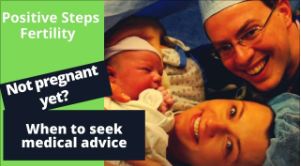It’s a common question for couples on their fertility journey and struggling to get pregnant: when should you seek medical help for infertility?
Of course, there’s always the temptation to listen to friends and family: “Hey if you give it a few more months, you’ll get pregnant.” While this can be true in some cases, it’s not always the reality for couples struggling to conceive.
What percentage of women get pregnant after stopping birth control?
A look at the data shows that the majority of women will get pregnant after stopping contraception within three months and 98% within two years. Our experience shows that:
- 75% of women will get pregnant within three months of stopping contraception and having “regular” sexual relations.
- 9 out of 10 women will get pregnant within six months
- 98% of couples trying over two years will succeed.
There are numerous studies that provide additional evidence to pregnancy success rates. According to a study from the UK’s National Health Service
- Most couples (about 84 out of every 100) will get pregnant within a year if they have regular sex and don’t use contraception.
- But women become less fertile as they get older. One study found that among couples having regular unprotected sex:
- aged 19 to 26 – 92% will conceive after 1 year and 98% after 2 years
- aged 35 to 39 – 82% will conceive after 1 year and 90% after 2 years
Additionally, an article in Parents has cited comprehensive study of nearly 60,000 women of child-bearing age who went off contraception:
- 21% of women got pregnant after just one ovulation cycle,
- 46% became pregnant after three cycles, and
- Nearly 80% of women became pregnant after one year — statistics similar to women who have never used oral contraception.
In reality, most people get pregnant quickly. So, the number one rule as to whether or not you should seek fertility help is to consider how long you’ve been trying. If it’s been a year or longer and you haven’t been able to conceive, you should seek medical counseling.
Sometimes you shouldn’t hesitate to see a fertility specialist
There are also other exceptions that should cause couples to consult a fertility specialist right away.
#1. Your age may be a determining factor in seeking fertility advice sooner
How exactly does age affect a woman’s ability to get pregnant? If you’re over 35, your biological clock is certainly ticking, and you have fewer eggs to draw upon.
Generally, as you age the number of quality eggs you have in reserve diminish.
- When you’re in your 20s, 80-90% of eggs are chromosomally normal.
- As you get into the early 30s, maybe 2/3rds are good.
- And as you get to mid to late 30s, roughly 1/3rd are good quality.
- Certainly by the 40s, it’s reduced to a quarter or less.
- By 45, you can even see 90-95% of eggs are chromosomally abnormal.
It’s not just a quantity issue, but a quality issue as well. The more eggs you have available, the more likely you are to have some healthy ones. Also, the older we get, generally speaking, the more likely there’s a quality issue. So, for instance, if you’re 45 and you have one egg to choose from in a month and 90-95% are abnormal, you might only release one high quality egg per year, which makes it really hard to get pregnant downstream.
Simply put, there are fewer opportunities for an older woman to conceive, compared to a woman who is 30.
#2. Underlying medical conditions can cause infertility.
Another indicator that you should see a fertility specialist is the presence of an underlying medical condition. This rule pertains to both partners, given that sperm can be affected just as easily as eggs can.
Some factors that can impact your reproductive outcomes include:
- A medical event can impact reproductive outcomes. Some examples include a physical injury, chemotherapy, radiation, or surgery that removes part of your ovary.
- Autoimmune diseases: inflammation caused by autoimmune diseases such as diabetes, autoimmune thyroiditis, and lupus are linked to decreased fertility.
- Lifestyle factors known to impact reproductive health. Some examples include
- poor nutrition habits
- Being over or underweight
- exercising too much
- psychological and emotional stress
- environmental and occupational exposures
- smoking
- illicit drug use
- Overconsumption of alcohol and caffeine
Note: Men with diabetes are at risk for retrograde ejaculation, a condition where sperm actually doesn’t make its way into the ejaculate.
#3. Are you struggling to conceive in silence?
Don’t destroy a relationship for the sake of expanding it.
Women and couples often put enormous stress and burdens on themselves when they struggle to conceive. Everyone tells them: “it’s going to be easy, relax, take a vacation or lose some weight and then you’ll get pregnant.” In fact, what is preventing them from getting pregnant often has nothing to do with these environmental issues.
The ability to remove all the stresses people put upon themselves when struggling to conceive is significant. As long as you take your meds and show up to your appointments, the fertility clinic will usually take care of the rest Having an expert get this burden off your shoulders goes a very long way towards easing your stress.
#4. When you’re confused about ovulation and conception
Being confused about ovulation and conception can have a profound effect on a couple’s ability to conceive. Couples are often inefficient in their approach to pregnancy. They frequently do not understand the timing and biological factors needed to optimize their fertility chances.
The reality is that some couples are just having intercourse at the wrong time. For instance, they may be misinformed about basal body temperature (BBT), which rises after ovulation. But if you wait until your BBT goes up then it’s already too late, because you’ve already ovulated.
This is just one example of the small but important details that can be cleared up simply by speaking with a fertility specialist.
Let us know if you have any questions concerning your fertility journey. We would be happy to help, so please feel free to reach out to us today.
Dr. Preston Parry
Positive Steps Fertility
#Infertility #TTC
All content on this Web site, including medical opinion and any other health-related information, is for informational purposes only and should not be considered to be a specific diagnosis or treatment plan for any individual situation.




